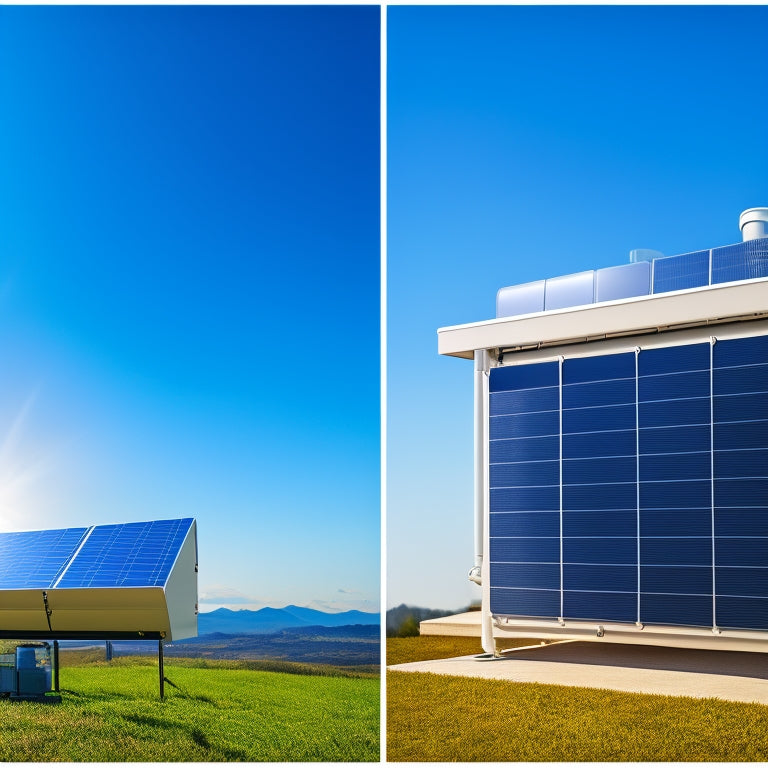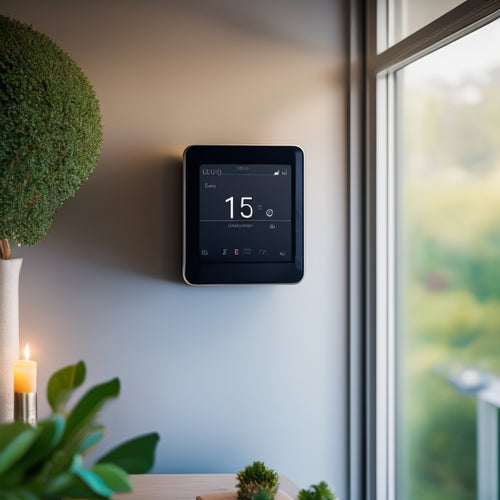
Why Choose Heat Pumps Over Solar Water Heaters?
Share
You'll find that heat pumps are a superior choice to solar water heaters due to their higher energy efficiency rates, with a coefficient of performance (COP) of 3-4 compared to solar water heaters' COP of 0.8-1.2. This means you'll get more energy out of every unit of electricity consumed. Additionally, heat pumps require lower upfront installation costs, offer a space-saving design, and provide a consistent hot water supply, even in cold conditions. They also reduce your carbon footprint and offer flexible heating modes. As you weigh the benefits, you'll realize that heat pumps provide a more reliable, cost-effective, and environmentally friendly solution for your hot water needs, and there's more to reveal about their advantages.
Key Takeaways
- Heat pumps offer higher energy efficiency with a coefficient of performance (COP) of 3-4, outperforming solar water heaters with a COP of 0.8-1.2.
- Heat pumps provide lower upfront installation costs and more financing options, making them a more affordable choice compared to solar water heaters.
- Heat pumps operate on electricity, which can be generated from renewable sources, minimizing environmental impact and carbon footprint.
- Heat pumps feature compact installation, providing space-efficient design and seamless integration into existing plumbing systems.
- Heat pumps offer dual heating capabilities, allowing switching between electric heating and heat pump heating for optimal performance and energy efficiency.
Higher Energy Efficiency Rates
How efficiently do you want your water heating system to operate? When it comes to energy performance, heat pumps outshine solar water heaters.
With a coefficient of performance (COP) of 3-4, heat pumps can provide 3-4 units of energy for every unit of electricity consumed. In contrast, solar water heaters typically have a COP of 0.8-1.2, resulting in lower energy performance.
Shifting to renewable energy sources, such as renewable energy, can lead to significant reductions in greenhouse gas emissions, contributing to a more sustainable future. Additionally, adopting renewable energy can lead to substantial fuel cost savings, enhancing return on investment.
This translates to significant cost savings for you. By choosing a heat pump, you can enjoy reduced energy bills and a lower carbon footprint.
With heat pumps, you're not only saving money but also gaining independence from fossil fuels. Opt for a heat pump and experience the freedom that comes with maximizing your energy performance.
Lower Upfront Installation Costs
Your wallet will appreciate the lower upfront installation costs that come with heat pumps. While solar water heaters require a significant initial investment, heat pumps offer a more affordable entry point. This reduced upfront cost translates to more financial freedom for you.
Additionally, many installation financing options are available, making it even easier to get started with a heat pump. Fleet owners are also exploring renewable energy solutions to reduce their carbon footprint, and heat pumps can be a beneficial addition to their sustainability efforts.
Space-Saving Design Advantage
As you weigh the benefits of heat pumps against solar water heaters, another key advantage comes into play: space-saving design.
Heat pumps boast compact installation, allowing for a more discreet presence in your home. This means you can allocate precious space to other important features or simply enjoy a more minimalist aesthetic.
Furthermore, heat pumps can be seamlessly integrated into your existing plumbing system, ensuring aesthetic integration that doesn't compromise your home's visual appeal.
With the rise of eco-friendly stops, homeowners are prioritizing sustainable solutions, and heat pumps fit the bill.
In addition, the focus on renewable energy sources for EV charging has led to increased interest in space-efficient designs.
Consistent Hot Water Supply
You need a consistent hot water supply, especially during winter when it's essential for comfort and hygiene.
Heat pumps and solar water heaters differ in their reliability to provide hot water during this period, with heat pumps offering a more consistent supply.
As companies like DHL and Anheuser-Busch have shown in their fleet electrification efforts, strategic planning and infrastructure investment are vital for reliable operations.
You'll want to evaluate which technology can guarantee a hot water supply, even on cloudy or cold days.
Reliability in Winter
During periods of prolonged cold weather, a consistent hot water supply becomes increasingly essential, especially when it comes to daily necessities like showering and washing dishes. You need a system that can deliver hot water reliably, even in the coldest months. Heat pumps excel in winter performance, thanks to their heat pump durability and cold climate efficiency. They provide seasonal reliability, frost protection, and winter operation that you can count on.
| System | Winter Performance | Heat Source Versatility |
|---|---|---|
| Heat Pumps | Unaffected by cold temperatures | Can recover energy from air, water, or ground |
| Solar Water Heaters | Slows down in cold weather | Limited to solar radiation only |
| Conventional Heaters | Inefficient in cold weather | Relies on fossil fuels only |
| Hybrid Systems | Combines benefits of heat pumps and solar water heaters | Offers flexibility in heat source selection |
Hot Water Guarantee
With a reliable hot water supply being paramount in cold weather, it's essential to have a system that can consistently deliver hot water when you need it most. A heat pump system guarantees a steady supply of hot water, even during prolonged periods of cold weather.
This is because heat pumps can draw heat from the air, even in freezing temperatures, ensuring a consistent supply of hot water. In contrast, solar water heaters rely on sunlight, which may be scarce during winter months, leading to reduced hot water storage.
Additionally, just like solar energy reduces grid reliance and generates clean energy, heat pumps reduce reliance on traditional energy sources, contributing to a more sustainable future.
Heat pumps' ability to provide a hot water guarantee means you'll never have to worry about running out of hot water, ensuring your freedom to enjoy a warm shower whenever you want.
This reliability also contributes to system longevity, making heat pumps a more sustainable choice.
Reduced Carbon Footprint Impact
When you opt for a heat pump or solar water heater, you're markedly reducing your carbon footprint.
You'll enjoy lower emissions output, as these systems don't burn fossil fuels to generate heat.
Lower Emissions Output
Your carbon footprint shrinks considerably with heat pumps and solar water heaters, as both alternatives produce substantially lower emissions compared to traditional fossil fuel-based systems.
When it comes to emission standards, heat pumps have a clear advantage. They operate on electricity, which can be generated from renewable sources, resulting in a markedly reduced environmental impact.
In contrast, solar water heaters still rely on backup power from fossil fuels during periods of low sunlight, increasing their emissions output.
By choosing heat pumps, you'll reduce your reliance on non-renewable energy sources, aligning with your values of freedom from environmental harm.
With heat pumps, you can enjoy a cleaner, more sustainable lifestyle while meeting your hot water needs.
Energy Efficiency Gains
Frequently, homeowners overlook the significant energy efficiency gains offered by heat pumps and solar water heaters, which can dramatically reduce their carbon footprint impact.
However, when you choose a heat pump, you'll enjoy higher energy efficiency ratings, often above 300%. This means you'll reap substantial cost savings, as heat pumps can provide up to 4 units of energy for every unit of electricity used.
In contrast, solar water heaters typically operate at around 80% efficiency. By opting for a heat pump, you'll not only reduce your energy bills but also minimize your environmental impact.
With a heat pump, you'll be doing your part to protect the planet while enjoying significant cost savings.
Cleaner Hot Water
A rejuvenating shower or a warm bath is a daily luxury many of us take for granted, but the traditional methods of heating water can be a significant contributor to our carbon footprint.
You may not realize it, but the energy used to heat water in your home has a substantial environmental impact. By switching to a heat pump, you can drastically reduce your carbon footprint and contribute to a cleaner environment.
Some of the benefits of heat pumps over traditional water heating methods include:
- Reduced greenhouse gas emissions, leading to a lower carbon footprint
- Lower energy consumption, resulting in long term savings on your utility bills
- A decrease in air pollution, improving local air quality
- Compliance with increasingly stringent environmental regulations
Flexibility in Water Heating Modes
When it comes to water heating, flexibility is key. You want a system that can adapt to your changing needs and preferences. Heat pumps offer dual heating capabilities, allowing you to switch between different heating modes depending on your requirements. This operational versatility is particularly useful during periods of high demand or when you need to prioritize energy efficiency.
| Heating Mode | Description |
|---|---|
| Electric Heating | Uses electricity to heat water, ideal for high-demand periods |
| Heat Pump Heating | Utilizes ambient heat to warm water, energy-efficient and eco-friendly |
| Hybrid Heating | Combines electric and heat pump heating for ideal performance and efficiency |
| Smart Heating | Automatically adjusts heating mode based on your schedule and preferences |
Smoother Maintenance Experience
Your water heating system's maintenance requirements can considerably impact your overall experience.
Heat pumps offer a smoother maintenance experience compared to solar water heaters. With heat pumps, you'll enjoy a more user-friendly operation and cost-effective upkeep.
Here's why:
- No risk of scaling or corrosion, reducing the need for frequent descaling and replacement of parts.
- Fewer moving parts means less wear and tear, resulting in fewer repairs and replacements.
- Easy access to components simplifies maintenance tasks, reducing labor costs and downtime.
- Heat pumps can be easily integrated with existing plumbing systems, minimizing installation and maintenance challenges.
Frequently Asked Questions
Can Heat Pumps Be Installed in Areas With Extreme Temperatures?
You might think heat pumps won't perform well in extreme temperatures, but you'd be wrong; modern heat pumps are designed to maintain efficiency even in -20°C or 40°C temperatures, ensuring consistent hot water supply regardless of outdoor conditions.
Do Heat Pumps Require More Maintenance Than Solar Water Heaters?
You'll find that heat pumps generally require less maintenance compared to solar water heaters, resulting in lower maintenance costs, and their energy efficiency guarantees you enjoy more freedom from high energy bills and environmental concerns.
Are Heat Pumps Suitable for Large Families or Commercial Use?
You'll be amazed at how seamlessly heat pumps cater to large families and commercial use, offering unparalleled energy efficiency and surprisingly low installation costs, making them an ideal choice for your freedom-loving, eco-conscious lifestyle.
Can Heat Pumps Be Used in Conjunction With Existing Water Heaters?
You can integrate heat pumps with your existing water heaters, but you'll need to address compatibility concerns and optimize their energy efficiency to maximize benefits, ensuring a seamless and liberating shift to a hybrid system.
Do Heat Pumps Have a Longer Lifespan Than Solar Water Heaters?
You'll find that heat pumps typically outlast solar water heaters, with an average lifespan of 15-20 years, thanks to their lower installation costs and reduced wear-and-tear from constant energy efficiency optimization.
Related Posts
-

Smart Energy: Greener Homes With Connected Power Devices
You can control and optimize your energy consumption with smart energy devices, reducing your carbon footprint by up ...
-

10 Best Energy-Efficient External Hard Drives for Sustainable Offices
When it comes to sustainable offices, you need external hard drives that balance data storage needs with energy effic...
-

What Water-Saving Gardens Complement Electric Vehicle Ownership?
As you pair your electric vehicle with a water-saving garden, you're not only reducing your carbon footprint but also...


